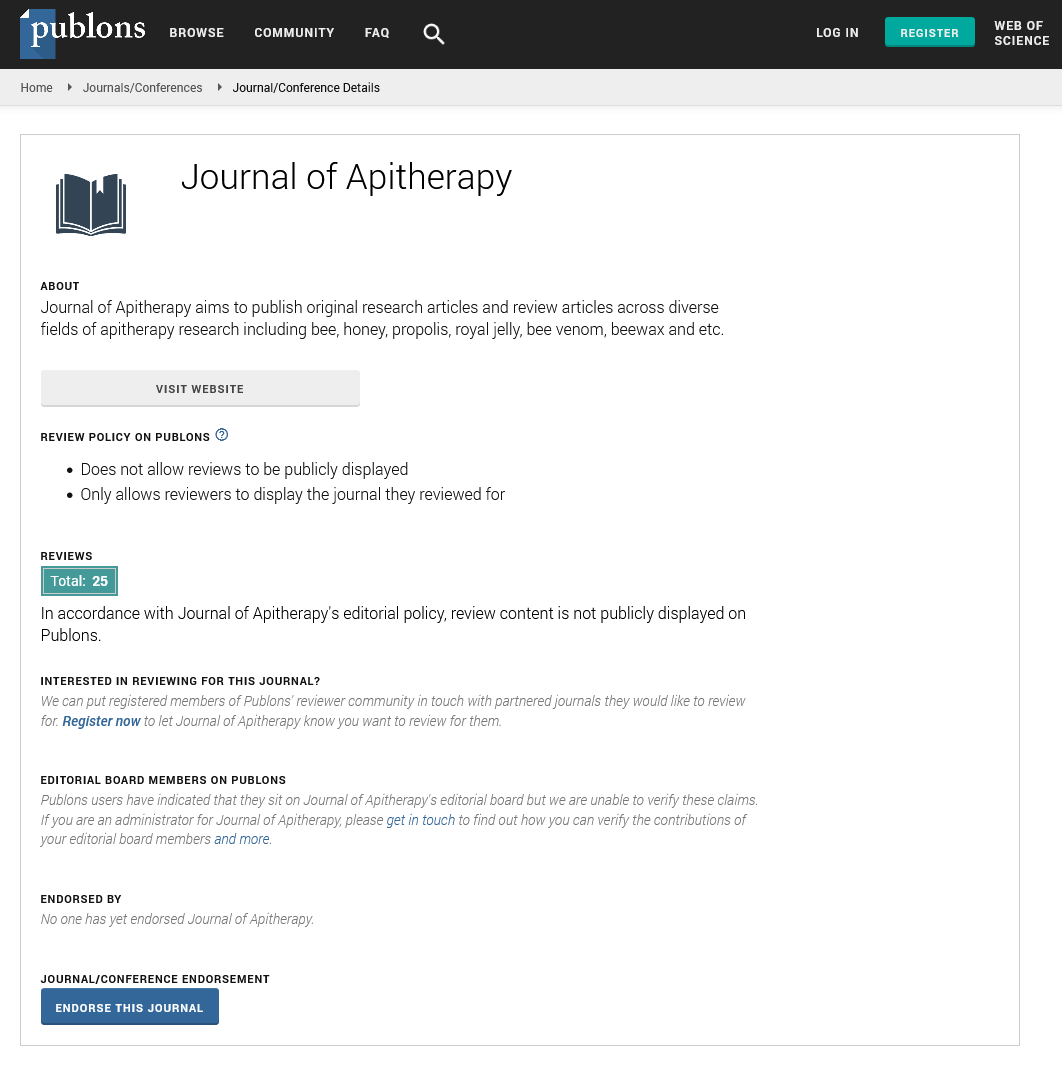Commentary - Journal of Apitherapy (2023)
Propolis in Dermatology: The Therapeutic Potential for Skin Health
Francesco Santini*Francesco Santini, Department of Biomedical Sciences, State University of New York, New York, USA, Email: Francesco@gmail.com
Received: 09-Sep-2023, Manuscript No. JAPITHERAPY-23-122287; Editor assigned: 11-Sep-2023, Pre QC No. JAPITHERAPY-23-122287 (PQ); Reviewed: 25-Sep-2023, QC No. JAPITHERAPY-23-122287; Revised: 02-Oct-2023, Manuscript No. JAPITHERAPY-23-122287 (R); Published: 09-Oct-2023
Description
Propolis, a resinous substance produced by bees, has been revered for centuries for its medicinal properties. While its historical use spans various cultures, propolis has recently gained attention in dermatology for its potential therapeutic applications in skin health. This article explores the composition of propolis, its historical use, and emerging research on its role in dermatological conditions.
Propolis in dermatological conditions
Wound healing: The wound-healing properties of propolis have been a subject of interest in dermatology. Studies have suggested that propolis can accelerate the wound healing process by promoting tissue repair, reducing inflammation, and preventing infection. Its antimicrobial activity helps create a protective barrier against pathogens, fostering a favorable environment for skin regeneration.
Acne and dermatitis: Acne and dermatitis are common skin conditions characterized by inflammation and microbial involvement. Propolis's anti-inflammatory and antimicrobial properties make it a potential adjunctive treatment for these conditions. Research indicates that propolis may help reduce acne lesions, alleviate inflammation, and inhibit the growth of acne-causing bacteria.
Psoriasis: Psoriasis is a chronic autoimmune skin disorder characterized by red, scaly patches. The anti-inflammatory effects of propolis may offer relief to individuals with psoriasis. Studies have explored propolis as a topical treatment, with findings suggesting its potential to mitigate psoriasis symptoms and modulate the immune response in the skin.
Dermatitis and allergies: Skin allergies and dermatitis often involve an inflammatory response. Propolis's anti-inflammatory properties may contribute to alleviating symptoms associated with allergic reactions and dermatitis. It has been studied for its potential to reduce itching, redness, and inflammation in allergic skin conditions.
Skin aging: The antioxidant content of propolis makes it a candidate for addressing skin aging. Oxidative stress is a contributing factor to premature aging, and propolis's ability to neutralize free radicals may help protect the skin from environmental damage. Additionally, propolis has been investigated for its potential to stimulate collagen production, promoting skin elasticity and firmness.
Propolis, with its rich historical legacy and multifaceted composition, holds promise as a therapeutic agent in dermatology. The diverse bioactive compounds present in propolis, from flavonoids to phenolic acids, contribute to its antioxidant, anti-inflammatory, and antimicrobial properties. While the integration of propolis into dermatological care is still evolving, preliminary research suggests its potential in wound healing, acne management, psoriasis relief, and addressing signs of skin aging. As scientists delve deeper into understanding the mechanisms of propolis in skin health, the future may unveil novel and effective skincare solutions derived from this natural bee product.
Propolis, a resinous substance produced by bees, has become a focal point in dermatological research due to its promising therapeutic potential for skin health. Rich in antioxidants, propolis exhibits anti-inflammatory, antimicrobial, and wound-healing properties, making it a compelling candidate for skincare applications. Studies have highlighted propolis's ability to promote collagen production, enhance skin elasticity, and accelerate the healing of wounds and burns.
Moreover, propolis has demonstrated efficacy against various skin conditions, including acne, eczema, and dermatitis. Its natural composition, comprising polyphenols and flavonoids, contributes to its anti-aging effects and protection against environmental stressors. As the skincare industry seeks natural alternatives, propolis stands out for its multifaceted benefits, offering a holistic approach to dermatological care. Harnessing the therapeutic potential of propolis may pave the way for innovative and nature-inspired solutions to promote skin health and address a spectrum of skin-related concerns.
As the demand for natural and holistic skincare solutions rises, propolis emerges as a compelling option. Its therapeutic potential in dermatology opens avenues for innovative formulations, providing a nature-inspired approach to nurturing and maintaining healthy skin. The exploration of propolis holds promise for revolutionizing skincare practices and enriching the dermatological landscape.







